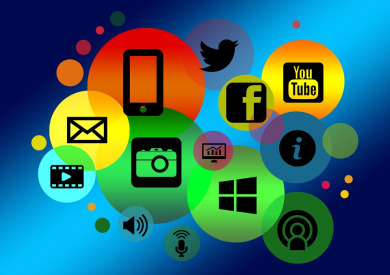The Internet: The Good, the Bad, the Ugly

The Internet provides many opportunities for people to communicate with one another via social networks, online games, phone calls, texting, etc.

The Good
The positive aspects to this connectivity are: the ability to easily contact friends and family who live in other states or countries, exposure to people and places across the world, and access to international news events as they are happening.
NOD participants can easily keep in contact with family and friends back home while living in the U.S.—and probably for free! This is a big change from years past when cell phones and Internet did not exist and phone calls made to other countries were very costly and therefore, rare.
The Bad
The Internet, social networks, and online games are all ways that keep people engaged with their (sometimes multiple) electronic devices for hours a day, sometimes to a degree that is not healthy for the mind, body, or real life relationships.
NOD students who have constant contact with friends and family back home tend to be more homesick and not enjoy their time on program simply because they are not allowing themselves the time to build relationships here. If students choose to spend all of their free time on the Internet instead of interacting with their Host Families and friends, this will interfere with having a successful exchange experience.
It is acceptable to use the Internet, social networks, and online games occasionally as a stress reliever or as a social activity, but it is important to balance free time with other activities that are not dependent upon the Internet.
The Ugly
Sometimes people forget that extra-curricular time online is a choice, because they begin to depend on checking or updating statuses, gaming with virtual friends, viewing pornography, etc. as determinants for personal happiness. These online habits become unhealthy (and verge on addiction) when daily life necessities such as: proper hygiene, eating healthy food, getting enough sleep and exercise are frequently ignored. It can also be deemed unhealthy when students start to neglect and not put time and effort into real life relationships.
If someone begins to suffer physical pain (a sore neck, aching wrists, strained eyes, etc.) from excessive Internet use/ gaming, it is safe to say that is not healthy and habits need to change in order to have a happier, healthier exchange experience.
Please Note
In the best interest of NOD participants, Host Families may provide reasonable guidelines regarding times of day when students can use the Internet for educational and/or personal purposes. Internet use should not interfere with a student’s ability to share meals with his/her Host Family, participate in family activities, or get enough sleep.
Students should also ensure, if using their Host Family’s computer/laptop/devices, to keep fonts, operating systems, and viewing habits safe and clean (no pornography, cyber bullying, and the like).
When was the last time you disconnected from the Internet for an entire day? What would you choose to do with those hours? Do you think you could do it? Please email and let us know what you did with your “Internet free” day! advising@nacelopendoor.org
Bibliography
Kuss, Daria J., Griffiths, Mark D., (2012) Online gaming addiction in children and adolescents: A review of empirical research. Journal of Behavioral Addictions, 1(1), 3-22. doi:10.1556/JBA.1.2012.1.1
Ng, Brian D., Wiemer-Hastings, Peter. (2005) Addiction to the Internet and Online Gaming. CyberPsychology & Behavior, 8(2), 110-113.
Raija-Leena Punamaki et al., Use of information and communication technology (ICT) and perceived health in adolescence: The role of sleeping habits and waking-time tiredness, Journal of Adolescence (2006), doi:10.1016/j.adolescence.2006.07.004